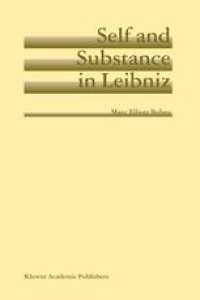
Ebook: Self and Substance in Leibniz
Author: Marc Elliott Bobro (auth.)
- Tags: Metaphysics, History of Philosophy
- Year: 2005
- Publisher: Springer Netherlands
- Edition: 1
- Language: English
- pdf
There is a close connection in Gottfried Wilhelm Leibniz’s mind between the notions of self and substance. R. W. Meyer, in his classic 1948 text, Leibnitz and the Seventeenth-Century Revolution, writes that “the monad … is nothing but a 1 représentation (in both senses of the French word) of Leibniz’s personality in metaphysical symbols; and there was, under contemporary circumstances, no need 2 to ‘introduce’ this concept apart from ‘propounding’ it. ” It is not clear what Meyer means here except that from the consideration of his own self, in some way Leibniz comes to his concept of simple substance, or monad. Herbert Carr, in an even earlier work, notes that Leibniz held that “the only real unities in nature are formal, not material. … [and] [f]or a long time Leibniz was content to call the formal unities or substantial forms he was speaking about, souls. This had the advantage that it referred at once to the fact of experience which supplies the very 3 type of a substantial form, the self or ego. ” Finally, Nicholas Rescher, in his usual forthright manner, states that “[i]n all of Leibniz’s expositions of his philosophy, 4 the human person is the paradigm of a substance.
We are omniscient but confused, says Leibniz. He also says that we live in the best of all possible worlds, yet do not causally interact. So what are we? Leibniz is known for many things, including the ideality of space and time, calculus, plans for a universal language, theodicy, and ecumenism. But he is not known for his ideas on the self and personal identity. This book shows that Leibniz offers an original, internally coherent theory of personal identity, a theory that stands on its own even next to Locke's contemporaneous and more famous version. This book will appeal not only to students of Leibniz's thought but also to philosophers and psychologists interested in methodological problems in understanding or formulating theories of self and personal identity.